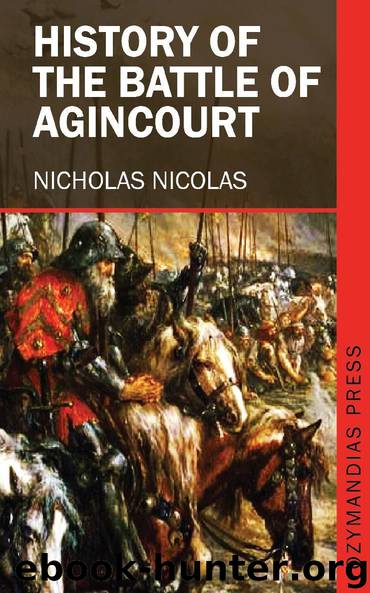History of the Battle of Agincourt by Nicholas Nicolas

Author:Nicholas Nicolas
Language: eng
Format: epub
Publisher: Ozymandias Press
The loss of the English army as appears from the following statement, has been variously estimated also. The discrepancies respecting the number slain on the part of the English, form a striking contrast to the accuracy of the account of the loss of their enemies. The English writers vary in their statements from seventeen to one hundred, whilst the French assert that from three, to sixteen, hundred individuals fell on that occasion. It is probable that the smallest numbers mentioned by the chroniclers of both nations referred only to the men-at-arms, but the gross amount of the slain, one hundred, as asserted by Elmham and Livius, appears to be an ample proportion of inferior persons. St. Remy, to whose narrative the greatest respect has been shown throughout this work, from his having been present in the English army, says, in which he is supported by Monstrelet, that sixteen hundred were killed, so that if Fenin and Berry only alluded to the men-at-arms, the accounts of the French writers may be reconciled with each other. To make them agree with the English chroniclers, or to reconcile those writers with each other, is however impossible; but the manner in which the slain are noticed in the Chancellor’s speech to Parliament, in November, 1416, as well as in the proceedings relative to the wages of those who served in the expedition, admit of the inference that many more persons fell than are mentioned by them.
The names of the English who were killed at Agincourt which are recorded, are the Duke of York, the Earl of Suffolk, Sir Richard Kighley, David Gamine, Esq., Thomas Fitz-Henry, and John de Peniton; John Garrew was taken prisoner in the battle, and Lewis Cadowen was slain before it commenced. It is not certain in what manner the gallant Duke of York lost his life. Leland states that being a very stout man he was thrown down and suffocated, but a rhyming chronicler says his basinet was beaten into his brain. The Duke of Gloucester who was severely wounded did not recover until after his arrival at Calais.
Henry being left master of the field, which was covered with waggons laden with provisions, bows, arrows, lances, and other military stores, walked over the plain, attended by several noblemen, and returned solemn thanks to God for his success. Whilst the soldiers were employed in stripping the dead, he called to him Montjoye, the principal Herald of France, and some English Heralds, and said to them, that this slaughter was not made by him, but by the Almighty, as a punishment, in his opinion, for the sins of the French. He demanded whether the victory belonged to him, or the King of France, to which Montjoye replied, to him. The King then asked the name of a castle which he saw near him, and being told that it was called Agincourt. “Then,” said he, “as all battles should bear the name of the nearest fortress to where they occur, this shall for ever be called, The Battle of Agincourt.
Download
This site does not store any files on its server. We only index and link to content provided by other sites. Please contact the content providers to delete copyright contents if any and email us, we'll remove relevant links or contents immediately.
| Africa | Americas |
| Arctic & Antarctica | Asia |
| Australia & Oceania | Europe |
| Middle East | Russia |
| United States | World |
| Ancient Civilizations | Military |
| Historical Study & Educational Resources |
1000 Years of Annoying the French by Stephen Clarke(784)
The Nostradamus Prophecies by Mario Reading(780)
Marie Antoinette by Fraser Antonia(726)
Marie Antoinette by Stefan Zweig(719)
A Little Tour In France by Henry James(715)
the Nostradamus Prophecies (2010) by Reading Mario(701)
The Last President of Europe by William Drozdiak(682)
The Dynamite Club(675)
0805097341 (N) by Andrew Dickson(666)
Secret Societies by James Wasserman(657)
Twenty Years After (Wordsworth Classics) by Alexandre Dumas(648)
Life in a Medieval City by Joseph Gies; Frances Gies(619)
El Enigma Sagrado(607)
The Greater Journey: Americans in Paris by David McCullough(605)
1922132403 (N) by Peter Seymour(596)
The Private Lives of the Impressionists by Sue Roe(582)
Montaillou by Emmanuel Le Roy Ladurie(561)
Rick Steves Italy 2020 by Rick Steves(560)
The Seine by Elaine Sciolino(548)
